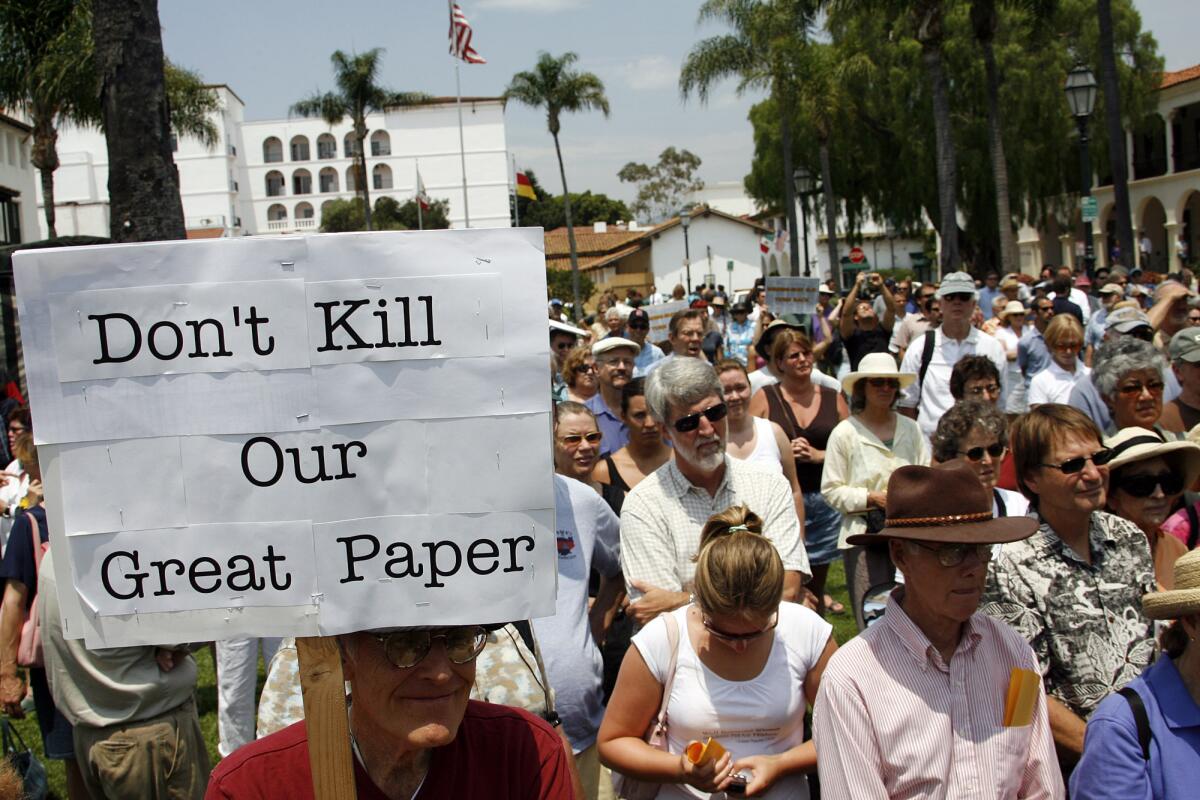Column: L.A.’s ultimate heartbreak industry isn’t Hollywood. It’s local journalism

- Share via
Whenever I think of the perilous state of local news, I think of Delicious Pizza in West Adams.
Great pizza! Small space, cool atmosphere. In the fall of 2017, I found myself there along with other journalism castoffs cursing the news gods.
I had just resigned as editor of OC Weekly after I refused to lay off half the staff. Daniel Hernandez was out of a job at VICE News after nearly four years there. Julia Wick had led the original LAist until its owner shut down the website because he claimed it wasn’t economically successful. Former LA Weekly editor-in-chief Mara Shalhoup was axed alongside most of her writers and editors after a new owner acquired the venerable alt-weekly.
Over beers and slices, we laughed and shared stories and fretted about the eternal erosion that is American journalism. None of us were about to give up on our beloved profession, though. There was talk of creating our own publication, but nothing serious. Instead, we hugged and went on to the rest of our lives.
Today, Mara is ProPublica’s South editor. Daniel edits The Times’ food section. Julia is on The Times’ 2024 election team. I’m a Times columnista, of course, frequently using Southern California’s past as a prism to understand what’s happening now and what might occur in the future.
And boy, does it not look good for local journalism — again.
As the owner of more than 400 local weeklies and dailies in 46 states, Gannett stands as a telling illustration of the economics of local newspapers.
Last month, the nonprofit Long Beach Post, which expertly covered the port city while the Press-Telegram atrophied, laid off nearly everyone. The publication’s board of directors maintained the move was necessary to save it from financial ruin — but former staffers insist it was retribution for their attempt to form a union.
Reporters for Knock LA, which focuses on social justice issues and law enforcement corruption, accused the publication’s sponsors, the leftist group Ground Game LA, of exiling them after they asked to spin off Knock into its own standalone entity.
For the record:
4:09 p.m. April 17, 2024An earlier version of this article said that Ground Game LA is the fiscal sponsor of Knock LA. Knock LA is part of Ground Game LA, and the two organizations share funding.
In the for-profit world, L.A. Taco, which centers food coverage while covering working class communities across Southern California, furloughed nearly everyone on its small team. Editor-in-chief Javier Cabral said they would be laid off if the publication isn’t able to hit 5,000 members by the end of April. (They were at 2,800 as of Monday). This follows the shuttering of one of California’s oldest continuously operating newspapers, the Santa Barbara News-Press, last year.
And, of course, there’s this paper. More than 100 of my colleagues were laid off last summer and earlier this year. Others took buyouts, and it seems recently that farewell emails from colleagues moving on to other jobs or retiring hit my mailbox daily.
It’s easy to portray what’s going on in local media as unprecedented and catastrophic, especially in the face of similar layoffs nationwide during an election year where accurate facts and nuanced coverage matter more than ever. But Southern California has always been an ossuary of failed publications done in by apathetic readership, clueless owners or a combination of both.

Every generation in L.A. seems to suffer a journalism mass extinction event. In addition to what’s happening right now and what happened in 2017, there was the shuttering of two alt-weeklies, Los Angeles CityBeat and the Long Beach-based The District Weekly, at the turn of the aughts. I remember the demise of La Banda Elastica and Al Borde, two Spanish-language publications that focused on rock en español through the late 1990s and 2000s. Older folks will remember the end of the L.A. Herald Examiner in 1989, whose grandiose downtown headquarters are now used as a satellite campus by Arizona State University.
L.A.’s heartbreak industry isn’t Hollywood; it’s journalism. To paraphrase what the late A. Bartlett Giamatti said about baseball, it’s designed to break the hearts of those who work it.
You join the profession knowing that long hours, low pay and no respect from the public is the norm, yet you jump in anyway. You revel in your colleagues, your shared sense of mission and the stories you do — but then the reality of economics sets in, and you realize the good times won’t last. You wonder why readers don’t subscribe, why editors and publishers don’t innovate. You see co-workers lose their jobs or leave the profession — and then it’s your turn, one way or another.
It’s easy to armchair quarterback why publications fail. Blame technology, fragmented audiences, a lack of trust in news — it’s all of that, and more. But these conditions existed before photos appeared in newspapers, and will persist long after whatever Elon Musk inserts in our brains so we can’t quit X.
Local journalism is collapsing in many places around the world. The result: higher levels of corruption and greater vulnerability to purveyors of propaganda.
What’s going on in Southern California journalism is sadly familiar — yet not hopeless. There is something new with this generation of journalism orphans. In the past, we downed shots and mourned as our publications died. Now, to paraphrase another literary luminary, Dylan Thomas, reporters are not going gentle into that good night.
Long Beach Post and Times staffers have publicly protested against their bosses. Knock L.A.’s banished writers and editors are shaming their former benefactors online. L.A. Taco is asking for money like an NPR host during a fund drive pounding nitro cold brew.
“We went public with our dire situation, because how can you expect help if you don’t ask for it?” said Cabral, 35, who I’ve known since he was a teenager with his own food blog. “Journalism for me has always been a fleeting career in flux that pulls the rug right under you when you start to get comfortable.”
I wish all of these folks well as they try to make it, including my colleagues at The Times, which has been unionized since 2018 and where we’ve worked for almost a year and a half without a contract. But even if we all fail, the dream to do good journalism in Los Angeles will never die. More publications are already rising.
The Los Angeles Public Press is barely a year old but is already making an impact with its coverage of the San Fernando Valley and Southeast L.A. County. Caló News, which focuses on Latino issues, will launch its own initiative to cover southeast L.A. County this summer. Newsletters run by individuals are filling in news holes and getting subscribers in the process. Hyperlocal publications like The Eastsider and This Side of Hoover are still informing readers about their communities.
Last month, I attended a forum at City Club LA hosted by the nonprofit Latino Media Collaborative, which sponsors Caló News, about what it deemed a “crisis” in Southern California journalism. Among the speakers were former La Opinión publisher Monica C. Lozano and California Community Foundation Chief Executive Miguel A. Santana. The conference room was packed with reporters young and old hoping to plug into the millions of dollars that local and national philanthropic organizations are planning to spend on L.A.-focused news operations in the coming years.
I wish them well, too — because someone has to succeed in this cursed industry, right? Right?
More to Read
Sign up for Essential California
The most important California stories and recommendations in your inbox every morning.
You may occasionally receive promotional content from the Los Angeles Times.













